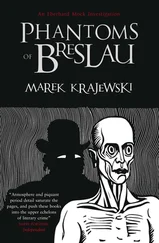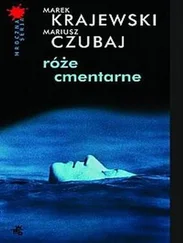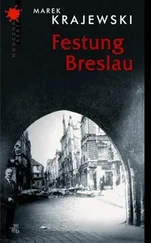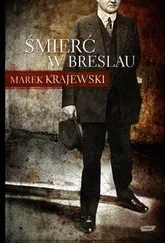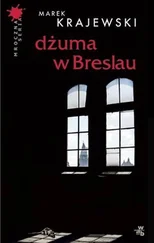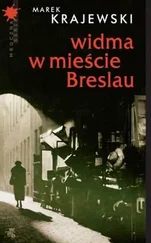Marek Krajewski - Death in Breslau
Здесь есть возможность читать онлайн «Marek Krajewski - Death in Breslau» весь текст электронной книги совершенно бесплатно (целиком полную версию без сокращений). В некоторых случаях можно слушать аудио, скачать через торрент в формате fb2 и присутствует краткое содержание. Жанр: Полицейский детектив, на английском языке. Описание произведения, (предисловие) а так же отзывы посетителей доступны на портале библиотеки ЛибКат.
- Название:Death in Breslau
- Автор:
- Жанр:
- Год:неизвестен
- ISBN:нет данных
- Рейтинг книги:3 / 5. Голосов: 1
-
Избранное:Добавить в избранное
- Отзывы:
-
Ваша оценка:
- 60
- 1
- 2
- 3
- 4
- 5
Death in Breslau: краткое содержание, описание и аннотация
Предлагаем к чтению аннотацию, описание, краткое содержание или предисловие (зависит от того, что написал сам автор книги «Death in Breslau»). Если вы не нашли необходимую информацию о книге — напишите в комментариях, мы постараемся отыскать её.
Death in Breslau — читать онлайн бесплатно полную книгу (весь текст) целиком
Ниже представлен текст книги, разбитый по страницам. Система сохранения места последней прочитанной страницы, позволяет с удобством читать онлайн бесплатно книгу «Death in Breslau», без необходимости каждый раз заново искать на чём Вы остановились. Поставьте закладку, и сможете в любой момент перейти на страницу, на которой закончили чтение.
Интервал:
Закладка:
Forstner entered the lift, losing the obsequious porter from view. The lift moved at a leisurely pace. It passed the first floor and found itself between flights. Forstner disliked these moments. He was pleased when the level of the lift floor was at one with the level of a landing; he would then jump out sprightly, smiling like a man of the world. When the lift neared the second floor, Forstner was initially surprised, then furious. On the threshold to the floor stood a man in a leather coat who obviously had no intention of moving aside in order to allow the policeman to leave.
“Get out of my way,” Forstner shouted and threw himself at the obstacle. His momentum, however, was incomparably lesser and weaker than the strength with which the pushy nuisance barged into the lift. He crowded Forstner into the depth of the cubicle and pressed him hard against the wall. The lift was reaching the third floor. Forstner tried to draw his gun. At that moment, he felt a painful prick in his neck. The lift was approaching the ninth floor. Sensual impressions such as the hammering of machinery and the rocking of the cubicle no longer reached Forstner. The lift crossed the attic in utter darkness and found itself on the ninth floor again. The man in the leather coat then got out and went down by way of the stairs.
Hans Barwick suddenly heard the wailing of the mechanism and the high squeak of chains. The racket was so piercing that only one, gloomy thought came to his mind: “Dammit, someone’s got their leg crushed again.” He stopped the lift and conquered the stairs, flight by flight, but it was not until the very top that he realized his suspicions had been somewhat optimistic. Between the ceiling of the lift and the threshold of the ninth floor shuddered the unnaturally contorted body of Max Forstner.
DRESDEN, MONDAY, JULY 17TH, 1950
HALF-PAST SIX IN THE EVENING
The square next to the Japanese Palace, not far from Karl-Marx-Platz swarmed with people, dogs and prams of yelling children. Those who had managed to find a bench in the shade could speak of great happiness. To the happy ones belonged the Director of the Psychiatric Hospital, Ernst Bennert, and an elderly man immersed in his newspaper. They sat at opposite ends of a bench. The elderly man did not show the least surprise when Bennert started to talk to himself in a half-whisper, but when a young woman with a little boy toddling beside her approached and politely asked whether she could sit down, the men looked at each other and, in unison, refused. She left, muttering something about old men, and Bennert immediately resumed his monologue. The elderly man listened through to the end, revealed his scar-ridden face from behind the newspaper and quietly thanked the doctor.
Extract from the secret report of a U.S.A. intelligence agent in Dresden M-234 May 7th, 1945
… during the bombing of Dresden, among others died … former Chief of the Criminal Department of Breslau Police, later Deputy Chief of the Abwehr Department of Internal Affairs, Eberhard Mock. He was under the care of agent GS-142 from whose reports it appears that between 1936 and 1945 Mock came to Dresden every two months and visited his relative, Herbert Anwaldt, in various hospitals. According to information obtained by agent GS-142, from 1936 Anwaldt stayed at the psychiatric hospital on Marien-Allee. When the hospital was closed down by the S.S. in February, 1940, Anwaldt did not suffer the fate of other patients shot somewhere in the forests near the village of Rossendorf: he ended up in the hospital for war veterans on Friedrichstrasse. Official hospital records contain fictitious information about the part played by Anwaldt in the campaign against Poland. The pseudo-veteran survived the bombing of Dresden in this same hospital. As of March this year, he is once more at the psychiatric hospital on Marien-Allee. Agent GS-142 did not succeed in establishing the nature of the relationship between Anwaldt and Mock since information offered by hospital staff was of a gossipy and scandal-mongering nature: because of the frequent visits, some claimed that Anwaldt was Mock’s illegitimate son, others that he was his lover.
DRESDEN, MONDAY, JULY 17TH, 1950
MIDNIGHT
Director Bennert walked in absolute silence down by the side staircase used only during apparent evacuations which thankfully had not recently been declared all that frequently. The shaft of torchlight cut through dense darkness. Ever since the city had been bombed, these narrow stairs had filled him with dread. On that memorable thirteenth day of February in 1945, as the noise of the first bomb resounded, Bennert had run down them to the cellar which had been turned into a provisional shelter. He had shouted his daughter’s name, searching for her among the crush on the stairs, but in vain. His cries had been lost in the din of the bomb and the horrific wailing of the sick.
He rejected the painful memories and opened the door leading out to the hospital park. Major Mahmadov was standing in the door. He patted Bennert jovially on the shoulder, passed him by and made his way upstairs. After a while, the sound of his footsteps disappeared. Bennert did not lock the door. He took his time going up. On the half-landing, he peered out of the window. Across the grass, flooded with moonlight, strode briskly an elderly man in uniform. Bennert would remember that walk for the rest of his life. Again he heard the noise of bombs, the wailing of the sick and through this same window saw an elderly man with sparks of fire in his hair and a burned face, carrying his unconscious daughter in his arms.
Nurse Jurgen Kopp sat down at a table with two colleagues, Frank and Vogel, and started to deal cards. Skat was a passion shared by all the lower ranks of the hospital staff. Kopp bid a bottle of wine and turned out a jack of clubs to draw trumps. He did not have time to win a hand, however, before they heard an inhuman cry from across the dark courtyard.
“Who’s that yelling his head off?” wondered Vogel.
“Anwaldt. His light’s just gone on,” Kopp laughed. “Seen another cockroach, I expect.”
Kopp was right in part. It was Anwaldt shouting. But not because of a cockroach. Along the floor of his room, comically twitching their abdomens, paraded four handsome, black, desert scorpions.
FIVE MINUTES LATER
Scorpions crawled over army trousers and hands covered in dark, thick hairs. One of the scorpions straightened its abdomen and climbed up to a double chin. It swayed on the half-open lips and stood on the gentle peak of a chubby cheek. Another, exploring an earlobe, strolled through thick, black hair. Yet another slid along the floor as if it wanted to escape from the puddle of blood pouring from Major Mahmadov’s throat.
BERLIN, JULY 19TH, 1950
EIGHT O’CLOCK IN THE EVENING
Anwaldt woke in a dark room. Before his eyes, he saw a ceiling with dancing reflections of water. He got up and, with an unsteady step, approached the window. Below flowed a river. On a barrier sat a couple tenderly embracing. In the distance flashed the lights of a great city. Anwaldt knew this city from somewhere, but his memory refused to obey him. The tranquillizers had reduced the speed of his association to zero. He swept his eyes over the room. The greyness of the floor was cut by a yellow streak of light coming in through the partially open door. Anwaldt pushed the door open wide and entered an almost empty room. Its severe, ascetic decor consisted of a table, two chairs and a plush sofa. On the floor and on the sofa articles of clothing lay strewn. He started to examine them and, after a while, segregated them clearly in his mind, using gender as the decisive criterion. From his analysis, he concluded that the man who had thrown his clothes about should have remained in nothing but one sock and underpants and the woman in stockings. He caught a glimpse of the couple sitting at a table and was pleased with the precision of his analysis. He was not far wrong: the plump blonde was indeed wearing nothing but a pair of stockings and the elderly man with a red, scarred face had on only his underpants. Anwaldt stared at him for a while and cursed his feeble memory yet again. He shifted his eyes to the middle of the table and remembered a frequent motif in Greek literature: anagnorismos — the motif of recognition. And so someone’s smell, wave of hair, some object would unravel a whole chain of associations, restore an obliterated likeness to features, generate past situations. Gazing at the chessboard laid out on the table, he stretched the string of his memory and experienced his anagnorismos .
Читать дальшеИнтервал:
Закладка:
Похожие книги на «Death in Breslau»
Представляем Вашему вниманию похожие книги на «Death in Breslau» списком для выбора. Мы отобрали схожую по названию и смыслу литературу в надежде предоставить читателям больше вариантов отыскать новые, интересные, ещё непрочитанные произведения.
Обсуждение, отзывы о книге «Death in Breslau» и просто собственные мнения читателей. Оставьте ваши комментарии, напишите, что Вы думаете о произведении, его смысле или главных героях. Укажите что конкретно понравилось, а что нет, и почему Вы так считаете.

